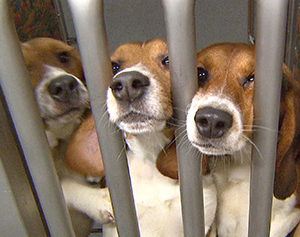Trinity College Dublin has spent over €600,000 in the past three years procuring 41 live beagle dogs, 69 pigs and over 16,000 mice for medical or scientific research, a Sunday Tribune investigation has established.
According to figures obtained by this newspaper under the Freedom of Information Act, Trinity also bought more than 2,300 rats – and four rabbits – in that time.
It is understood that most of the research funding comes from the government's multimillion-euro Science Foundation Ireland initiative.
Most of the animals are supplied by registered breeders and suppliers in Britain. Most if not all of the animals are put to death, either as part of the research – so that their tissues can be harvested for study, for example – or after experiments are carried out on them.
The figures reveal that, in 2006, Trinity spent €197,864 procuring 667 rats, 4,775 mice and 33 pigs. In 2007, it spent €193,174 on acquiring 785 rats, 6,152 mice, 21 pigs and 16 dogs.
In the first nine months of this year, spending rose to €237,052 on 932 rats, 5,531 mice, four rabbits, 15 pigs and 25 dogs.
Peter Nowlan, a veterinary surgeon and manager of TCD's Bio Resources Unit, said the animals were used for research into health problems such as cancer, Alzheimer's disease, arthritis and obesity.
He said Trinity was not the only university in Ireland that uses animals for research, and noted that it is subject to the college's strict ethical guidelines. Significant emphasis is placed on limiting the number of animals used, which he said makes it more expensive than other, non-animal based research.
"Everything would come in alive, but not all would be used for experiments alive," he said.
"Most of the animals will die, although we do rehome a few dogs. I would say 90%-plus of animals suffer very little ill effects, ie no pain or distress, except that they die humanely."
However, the revelation has prompted renowned author John Banville, who has previously been an outspoken critic of vivisection at the college, to once again for these practices to stop.
He said he was aware of kittens being blinded for research in some institutions, and dogs deliberately having their kidneys damaged elsewhere.
"Where I come from, I think this is absolutely wrong and morally indefensible," he said. "I don't care if it's one rabbit, or one mouse. It's wrong."
- John Downes


